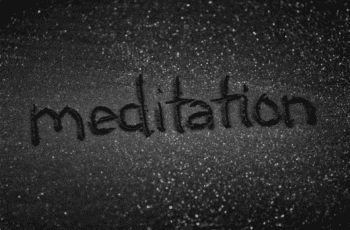I must start by thanking you. That’s because your comments to my last post made me realize that I might have caused some alarm with the number of hours I put into meditation. I might have mistakenly conveyed that without thousands of hours there is no hope. It’s not at all like that. Think of a mound of sand, every grain you add to it, will increase the size of the pile. If you keep adding, it’ll ultimately no longer be a mound but a mountain. An addition of one tiny grain of sand is imperceptible, but we can’t deny that without that, the mountain will be one particle smaller. Keep adding or keep taking away and soon the difference will be more than visible. Every moment of quality meditation is that grain of sand.
When I speak about meditation, I’d like you to think of learning a musical instrument. I’ll pick the example of the piano as I’m mildly familiar with tickling the ivories. One of my favorite pieces is La Campanella by Paganini-Liszt 1 and this interpretation by Evgeny Kissin is the one I like the most. A couple of years ago, I asked my piano teacher, Ramona Borthwick, if I would ever be able to play this piece. We estimated that at the rate I was putting in the hour(s), I was around 15 years away. (I think she was being generous.) Although in 2020, I took a hiatus and couldn’t pursue piano at all, I remain thankful to Ramona.
To play a piece like La Campanella, you need time, guidance, practice and dogged determination. Irrespective of who your mentor might be, regardless of how eager I may be to play it, developing virtuosity, dexterity and excellence takes time and effort.
That does not mean I can’t enjoy listening to a recording of La Campanella. It certainly doesn’t mean I can’t go into a concert and watch it live being played by a professional pianist. I can, of course, enjoy playing other songs on the piano (like Twinkle Twinkle Little Star – something I should be able to play, I reckon). But, if I want to experience the joy that comes from playing a piece, La Campanella in this case, I must be prepared to diligently put in the effort and not be intimidated by the total number of hours required.
Meditation is no different.
Each milestone you pass takes you to a different level of virtuosity in your consciousness. A mere few hundred hours too can infuse plenty of blissful experiences but a few thousand hours will catapult you to another dimension altogether. At any rate, every meditator at all levels, experiences some or all of the following side effects of meditation:
1. You develop detachment
The number one side effect of good meditation is that you sort of develop a natural detachment towards everything and everyone around you. It doesn’t mean that you no longer love what you do or that you don’t love your friends and family anymore. It simply means that somehow you experience this deep contentment and bliss within you. You realize the impermanent nature of this world. Things and objects you held in high regard earlier, hold little value now. That promotion, car, house or vacation, if they happen good, if they don’t, good. You care but you no longer lose sleep over such matters.
2. You can’t socialize much
This is one of the irreversible side effects. If earlier you could listen to loud music and socialize at parties and dance all night, you just find most of that pointless now. Your friends and colleagues may drag you to such parties and you may oblige them. You will even smile and engage in conversations in such settings, but the truth is deep within you can’t wait to get out of there and be back in the quiet and warm setting of your home. Earlier when you could shake a leg or two at the loud music, now you might be shaking your head and the music will give you an earache.
3. You crave solitude and silence
Even when back in the familiar surrounding of your home or relatives, you can’t help but want (and rejoice in) some solitude and silence. Earlier if roaming around touristy spots or going away on vacations gave you that joy, now, it would be to spend a few moments in your company, to be by the ocean or river, to be in nature’s lap or simply snuggle up in your warm bed. You may still step out occasionally of course, but mostly you are happy being by yourself. This is particularly dominant in the beginning stages of meditation. Over time, as your mind learns to adapt to the unlocking of this new level of consciousness, you may be more open to giving others company.
4. You step away from the rat race
You want to feel like the old times and want to have the same burning desire for material progress like the old you once used to, but with greater awareness you are unable to motivate yourself towards the attainment of goals that may only create more wealth but no fulfillment. Many things you admired earlier, no longer hold the same value in your life. If your friends and colleagues speak to you about how well they are doing, you introspect and discover that while you are happy for them, you no longer want all that running around. For what, for who, why? You begin to question and persistent questioning is the seed of lasting transformation.
5. You become increasingly aware of your thoughts
It can be quite disconcerting at first but one thing you unmistakably and repeatedly experience is the talkative nature of your mind. So much so that at times you wonder how you used to live earlier and if your mind was as chatty back then too. Awareness is the first step in any corrective step. With increasing awareness, you start questioning your thoughts and emotions too. Why am I feeling this way? Why am I thinking like this about this person? What is the reason of my current craving? And so on… Without this awareness, it is impossible to harness your mental and spiritual energy.
6. You experience sensations
Be it in your forehead or on the crown of your head, perhaps on one of the chakras or coursing throughout your body, you experience profound and beautiful sensations. What you also notice is that while these sensations are blissful for the most part, at times they can be distracting. It took me months to normalize myself after I came off the peak meditation practice. These sensations at times even bothered me because they were deep and constant.
7. You develop greater compassion and empathy
Whether you like it or not, even if it’s not suitable for the nature of your work, you develop compassion and empathy naturally. With razor-sharp awareness, you find yourself now more sensitive towards others’ feelings. You develop feelings of love and care towards all sentient beings. You realize that the same divine dwells in each and every person around you and therefore they are just as worthy as anyone else.
8. You become humble
One of the most remarkable outcomes of good meditation over a prolonged period is that you become more humble. Not just polite or courteous, humble. Even if you are offered a pedestal, you turn it down. In the beginning stages of meditation, as you start to unleash the power of your mind, feelings of superiority can creep in but as time passes, the exact opposite happens — you choose humility and service over any other option. You discover the immense strength that lives in humility like fire in an ember. You know for a fact that by being humble you will not hurt others.
9. You develop a very high personal benchmark
Intense and peak meditation gives you an incredible boost of willpower. With better awareness, an open and loving heart, with kindness seeped into your bones, something remarkable happens: you set a very high benchmark for yourself. With newfound deep reserves of willpower, you are able to live up to your own standards. I can’t even begin to stress the importance of living by your principles. It’s hugely empowering and liberating. You feel so in control of yourself.
10. You eat and sleep less
In the beginning, meditation is a pure mental act and requires a lot of mental energy. As you do it, you feel hungry. With a mind at ease, you even tend to eat and sleep more than usual. But, as time progresses, you find that you derive greater nutrition from your meals. You find them more fulfilling and your appetite for food and sleep diminishes. Once your brain gets used to the new level of awareness, you start eating and sleeping a bit more but never quite like the pre-meditation times. You find yourself brimming with energy even if you want to rest at times.
11. Your negative emotions and anger no longer overpower you
Earlier if each negative thought and emotion felt like a bullet piercing through an unsuspecting bird, now it’ll feel more like a gentle flower thrown at a carefree elephant. The power of your emotions and thoughts to catch you off-guard or weaken your resolve diminish greatly. Get used to the peak practice and you will feel like you have conquered your mind (though it may not last forever).
12. You couldn’t care less
As you establish yourself in the practice of meditation, after a while, you sort of become a rebel and develop this couldn’t-care-less attitude. Some of your friends and loved ones may not just call you crazy but may even vehemently oppose you taking up meditation. They may try to convince you that the new path you have chosen for yourself is nothing but ignorant and unnecessary. But, believe me, keep walking and watch everyone around you marvel at what good meditation will do to you. What’s more, you’ll be able to make a positive difference in the lives of many people. Above all, your self-esteem will hit an all-time high.
In medicine, a side effect is an effect, whether therapeutic or adverse, that is secondary to the one intended. 2 Therefore, if these are the side effects, what is the intended effect of meditation then?
Awakening.
The slumbering consciousness that has been so on account of the karmic impressions of numerous lifetimes awakens like a tsunami, washing away everything that comes in its path. All that’s undesirable (and the desirable too) gets wiped away giving you a clean slate. It’s an experience like no other. And, it’s yours for the taking.
Go on, play the La Campanella of meditation and then write your own. You can.
Peace.
Swami
Wish you a very happy new year. I hope you do something magnificent with your time and life in 2021.
And, some of you wrote in asking if you could meditate in the ashram. Of course, you are welcome to meditate in our ashram to intensify your practice as long as you are coming for at least ten days. Any less than that won’t be effective, I feel. We have the right environment and infrastructure. Due to the pandemic, however, you need to apply beforehand and wait for our confirmation before making any travel plans.
Editorial Note
While the side effects of meditation are certainly life-changing on their own, the practice of meditation by itself does a lot more. From changing the wiring of the brain to helping us quit smoking, its ability to transform one fundamentally cannot be overstated.
Course
Art of Meditation
Free yourself from suffering and live life to the fullest. Learn the yogic technique of meditation in 4 days (and master it over a lifetime)
The questions below provide an insight into some aspects:
Could quitting smoking be one of the positive effects of yoga and meditation? Is it possible to quit smoking easily?
Aristotle once said, “We are what we repeatedly do. Excellence, then, is not an act but a habit.” All reactions to almost everything in life spring from one’s habits. Even being positive or negative is a matter of habit more than anything else. Habits can be changed provided there is a serious inclination to bring such change backed by genuine effort.
If you just want to change but are not willing to put in the efforts, chances are, you will only experience frustration and it continues to grow as the gap widens between your desire to change and the actual effort.

To come off any form of habit or addiction, be it smoking, drinking, drugs, or any other, there are three methods. Read more here.
What are the effects of meditation when practiced over a prolonged period?
As some of you may know, a big part of my spiritual journey involved prolonged periods of intense meditation. Most of what I did was neither sane nor natural. And, I had no idea if it would amount to anything at all. Having said that, I thought maybe I should share with you some bits of my journey of several thousand hours and the side effects of meditation.

The total number of hours I meditated was 8000 + 5500 + 1680 = 15000+ hrs of meditation. It was important to share this detail with you so we may establish that my practice was divided into four kinds of spells, each one requiring a different level of concentration and stress on the brain. Read more here.
Does intense meditation practice really change brain function?
Just as it’s proven beyond a doubt that High-Intensity Interval Training (HIIT) for the body is a super-efficient and effective way of keeping your body fit, the Black Lotus meditation app is HIIT for your mind. That is, short sprints of deliberate and mindful meditation are more powerful than long durations of slack meditation.

I thought long and hard about what I should tell you about this powerful meditation app in its new avatar. What and how much should I share with you without boring you with the details? Why meditation and why Black Lotus?
And then I felt this under 3-min video will answer both questions, including addressing meditation effects on the brain. Watch it.
Notes
A GOOD STORY
There were four members in a household. Everybody, Somebody, Anybody and Nobody. A bill was overdue. Everybody thought Somebody would do it. Anybody could have done it but Nobody did it.
Don't leave empty-handed, consider contributing.It's a good thing to do today.









Comments & Discussion
322 COMMENTS
Please login to read members' comments and participate in the discussion.